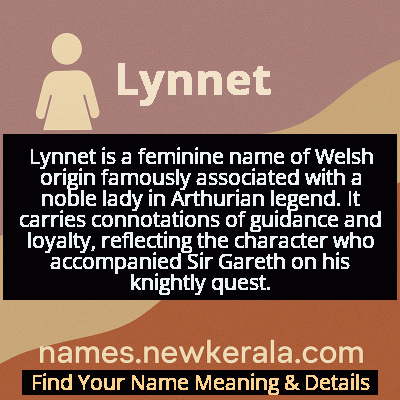Lynnet Name Meaning & Details
Origin, Popularity, Numerology Analysis & Name Meaning of Lynnet
Discover the origin, meaning, and cultural significance of the name LYNNET. Delve into its historical roots and explore the lasting impact it has had on communities and traditions.
Name
Lynnet
Gender
Female
Origin
Arthurian
Lucky Number
9
Meaning of the Name - Lynnet
Lynnet is a feminine name of Welsh origin famously associated with a noble lady in Arthurian legend. It carries connotations of guidance and loyalty, reflecting the character who accompanied Sir Gareth on his knightly quest.
Lynnet - Complete Numerology Analysis
Your Numerology Number
Based on Pythagorean Numerology System
Ruling Planet
Mars
Positive Nature
Generous, passionate, energetic, and humanitarian.
Negative Traits
Impulsive, impatient, moody, and can be overly emotional.
Lucky Colours
Red, maroon, scarlet.
Lucky Days
Tuesday.
Lucky Stones
Red coral, garnet.
Harmony Numbers
1, 2, 3, 6.
Best Suited Professions
Military, sports, philanthropy, leadership roles.
What People Like About You
Courage, energy, leadership, generosity.
Famous People Named Lynnet
Lynette Fromme
Political activist
Member of Charles Manson's cult known for attempted assassination of President Gerald Ford
Lynette Woodard
Basketball player
First female Harlem Globetrotter and Olympic gold medalist
Lynette Yiadom-Boakye
Visual artist
Turner Prize-nominated British painter known for figurative works
Lynette S. K. Davidson
Author
Award-winning children's book writer and poet
Name Variations & International Equivalents
Click on blue names to explore their detailed meanings. Gray names with will be available soon.
Cultural & Historical Significance
The name's Welsh origins connect it to Celtic mythology and the rich storytelling traditions of Wales. As a variant of 'Eluned' or 'Luned,' it carries echoes of ancient Welsh heroines and maintains a connection to Britain's pre-Arthurian cultural heritage. The name's persistence through centuries demonstrates how Arthurian romance has preserved and transmitted Celtic names into modern English usage, serving as a bridge between ancient Welsh culture and later medieval literary traditions. The character's evolution from critic to supporter also reflects broader cultural narratives about judgment, redemption, and the importance of demonstrated character over initial impressions.
Extended Personality Analysis
Individuals named Lynnet are often perceived as strong-willed, intelligent, and initially reserved in their judgments. Like their Arthurian namesake, they tend to be observant and discerning, carefully assessing situations and people before forming opinions. This analytical nature makes them excellent problem-solvers who approach challenges with thoughtful consideration rather than impulsive action. Their initial skepticism often gives way to deep loyalty once trust is earned, mirroring Lynette's transformation from critic to staunch supporter of Sir Gareth.
Lynnets typically possess a blend of practicality and idealism, balancing grounded realism with appreciation for noble principles. They often serve as guides or mentors to others, offering wise counsel born of careful observation. Their communication style tends to be direct yet nuanced, and they value authenticity in relationships. While they may appear cautious at first meeting, those who earn their trust discover individuals of profound integrity, courage, and unexpected warmth who remain steadfast in their commitments. This combination of critical thinking and deep loyalty makes them valued friends and reliable partners in both personal and professional contexts.
Modern Usage & Popularity
In contemporary times, Lynnet remains an uncommon but recognized name, primarily used in English-speaking countries with particular popularity in Wales and among families with Celtic heritage. The name experienced moderate usage during the mid-20th century but has become increasingly rare in recent decades, making it a distinctive choice for parents seeking traditional yet uncommon names. Its Arthurian connections appeal to literature enthusiasts and those interested in medieval history, while its soft phonetic qualities maintain its feminine appeal. Modern usage often favors the spelling 'Lynette' over 'Lynnet,' though both variations preserve the name's historical and literary significance. The name's rarity in the 21st century gives it an air of uniqueness while maintaining its classical roots, appealing to parents looking for names that are both distinctive and meaningful.
Symbolic & Spiritual Meanings
Symbolically, Lynnet represents guidance, transformation, and the journey from skepticism to trust. Like the Arthurian character who initially doubts but ultimately supports her companion, the name embodies the idea that true worth is revealed through action and character rather than initial appearances. It symbolizes the role of the wise guide who challenges others to prove their mettle, serving as a catalyst for personal growth and heroic development. The name also carries connotations of loyalty tested and earned, mirroring the medieval ideal of companionship forged through shared trials and demonstrated virtue. In broader symbolic terms, Lynnet represents the transformative power of experience and the importance of maintaining standards while remaining open to being pleasantly surprised by others' capabilities.

